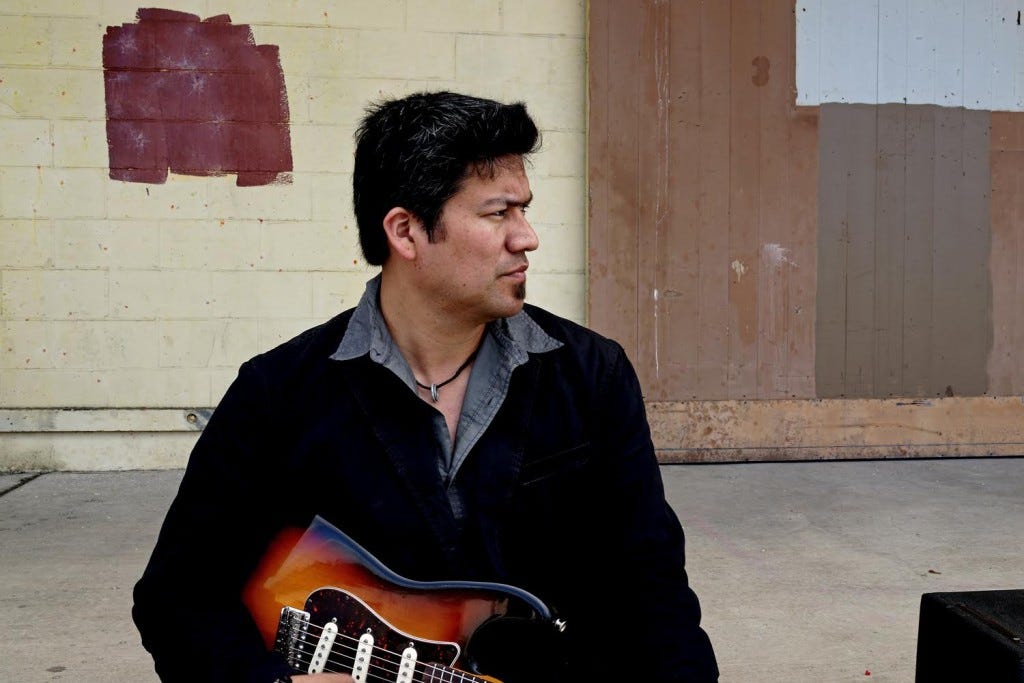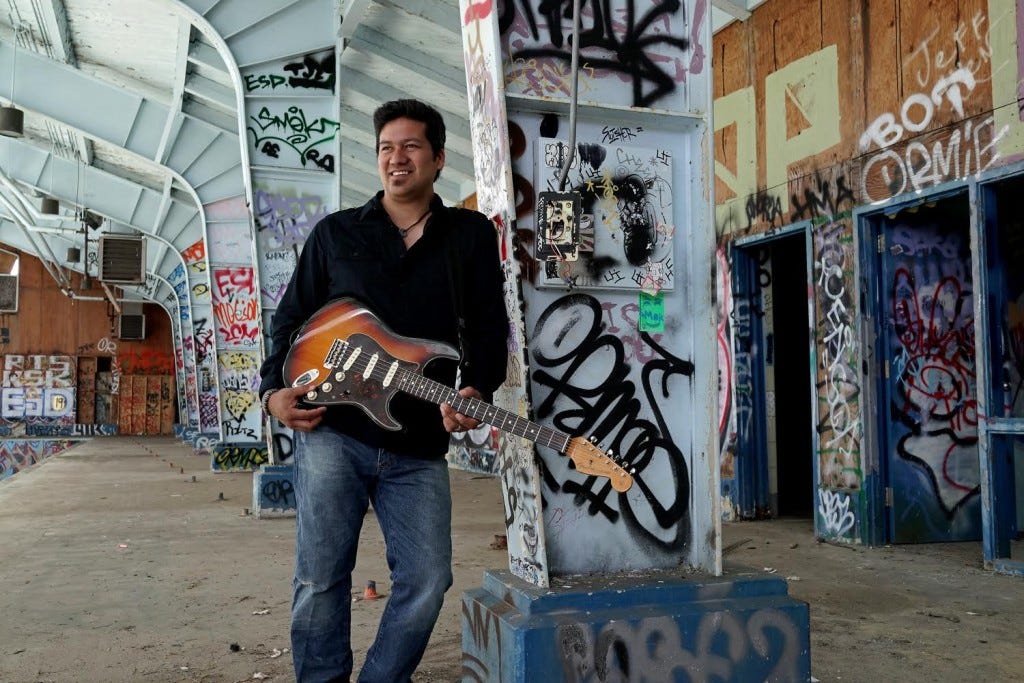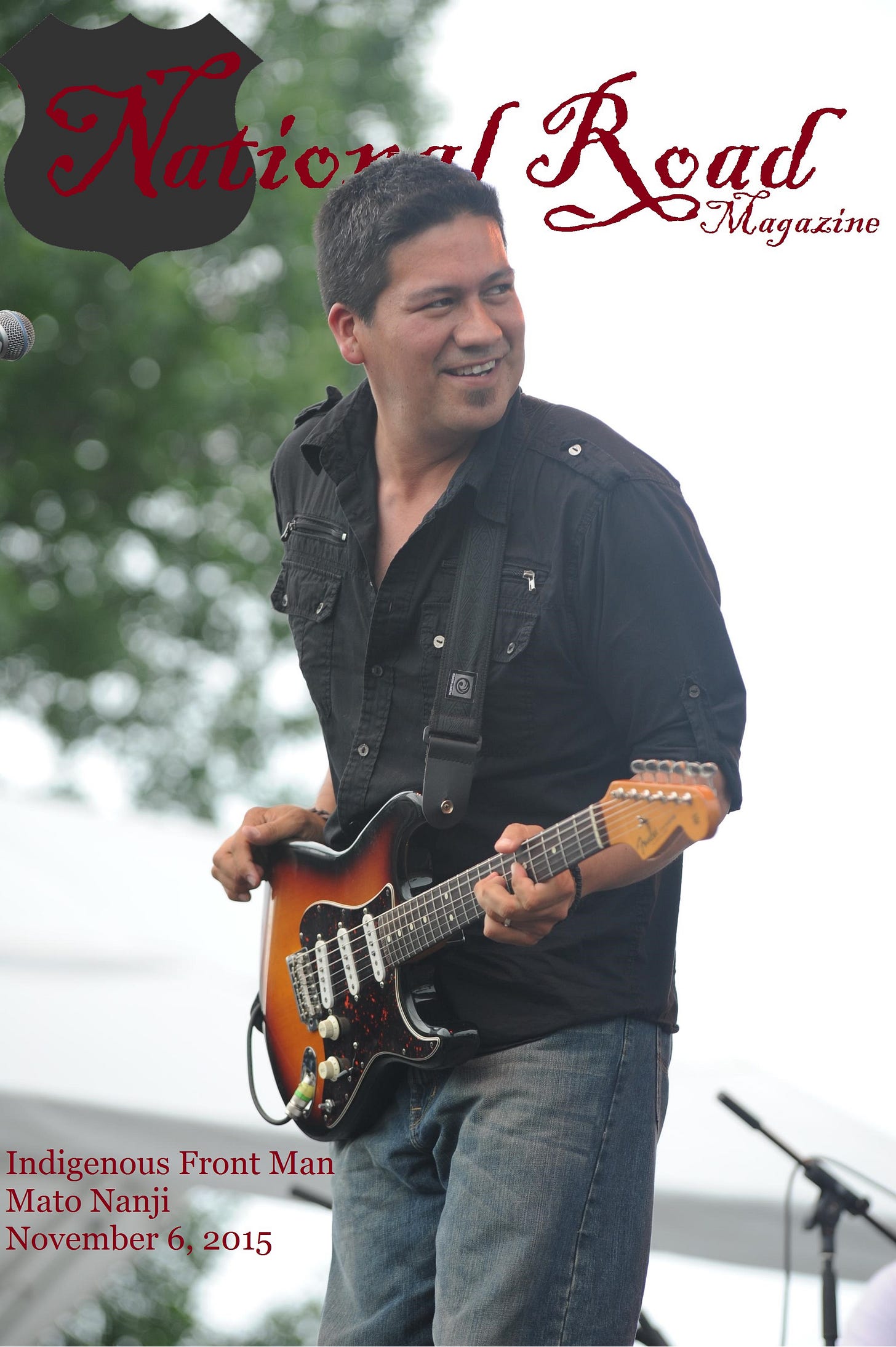Giving His Best: Indigenous' Mato Nanji
by Donovan Wheeler photos by Bruce Haley
[dropcap]M[/dropcap]ato Nanji has one of those disarming laughs—the casual, innocent kind which makes you think you’re talking to the guy you grew up with who now hangs drywall, shoots pool for a dollar a game, takes his kids to the lake for fishing trips, and drinks light beer with the Vikings game blaring in the background. When you ask him a question he gives a direct answer, and even though I couldn’t see his grin over the phone, I could feel it in the tenor of his voice and I could hear it in the sound of that sincere chuckle. When I first dialed his number I was two steps past nervous. I had already notched my first big interview via email, but this was my first time actually talking to someone who had taken his band to that level. After all, when he, his brother, his sister, and cousin formed the first iteration of Indigenous in the late 1990’s they turned the American blues scene on its head. Their debut album, Things We Do, propelled them onto the national stage, leading to appearances on NPR’s All Things Considered, a jam session on Conan O’Brien’s old NBC gig, and the admiration of the late B.B. King (who later invited them to play on his 1999 blues tour). By the time the core band made up of close family folded in 2006, Indigenous had notched three top-three Billboard blues albums, two Native American Music Awards for album of the year, and a #22 spot on Billboard’s pop music chart for the track “Now That You’re Gone” from the group’s first album. Since splitting, Nanji has maintained his role as the face of the band adding Levi Platero on guitar, his brother Douglas at the drum set, and Bronson Begay on bass. Still touring the US, Nanji and company will appear in the Circle City on November 13 playing a set as part of the Eiteljorg Museum’s larger celebration of Native American art. Additionally, Nanji—a member of the Nakota tribe currently living on the Yankton Indian Reservation in South Dakota—will resume his role as a contributing member of the Experience Hendrix tour early next year, including stops in both St. Louis and Cincinnati. Donovan Wheeler: I recently read that critics of your newest album, Time is Coming, claim that it is closer to a “rock” album than a blues project. Do these distinctions really matter to you? Are you okay with the labels people place on your music? Mato Nanji: “I don’t think the distinction matters that much. When I was growing up I listened to all kinds of music, so I always try to take pieces from that past and put it into what I do. And that way the result isn’t one type of sound or one genre of record. My goal is to stretch it out and try to touch on everything I’ve been influenced by. Blues, rock, R&B, soul music…everything influenced me. I grew up listening to the Eagles a lot, so even that country-rock sound had a big impact on me as well. Sum it all up, and it’s a pretty wide range of music that’s left its mark on me as singer and also as songwriter.”

DW: You also spoke about life growing up in ‘80’s with limited access to good radio music. As I recall, you talked about the airwaves being dominated by pop and country songs. What does that mean for you as a rock/blues artist growing up in an environment where it wasn’t very prevalent? MN: “Even to this day, most people are listening to what’s popular on the radio. So you’ve got a lot of country fans up here as well as throughout most of the Midwest. And that popularity moves from country to rap…many people like that as well. That means that the fan base around here, for the kind of music I do, is very small. Some time ago, it was non-existent, and it has slowly built up over the years. But you really have to get out and go elsewhere, to other states, other parts of the country to reach your fans.” DW: You’ve spoken at great length about the impact your father, Greg Zephier—who was also a very accomplished touring musician—had on you. I was hoping you could share your thoughts about his effect on you with me. MN: “He has been a huge influence on me, not just as a player but as a human being. It was his record collection (and my mom’s as well) which affected me. All those styles I mentioned before, along with the likes of Chicago and the Beatles…it all started there. There was always music in the house, and we’d listen to even more when we traveled with the family when we were kids. All of that got into my mind and guided me to approach music in those styles.” DW: Do you still write a lot of music with your wife, Leah? MN: “We still write a lot, mainly when I’m at home. I always keep an acoustic handy when something hits one of us. That’s how every song is written: you get an idea, or you just pick it up and play until an idea comes. I love that because you’re right there, and the sound is sitting in front of you. You can start working on it right away. And I always try to let these ideas happen and not force them…because you really can’t do that. I’ve never been like: ‘Well, I’m going to go write a song today,’ or anything like that. It just doesn’t work that way. When nothing new hits me, then I go back to an unfinished idea and develop it further. It’s probably different than the way a lot of other songwriters create, but this has always been how I’ve gone about it.” DW: Do you start with the music, or you begin with something lyrically? MN: “For me—since I try to play guitar [here he laughs…actually, he self-deprecatingly laughs with every answer]—the music comes first. Then what follows that will be a melody…on some occasions my wife will already have a melody. She’ll sing it to me, and I’ll create the music that falls behind it. Eventually we’ll move to lyrics and talk it out, slowly piecing it all together. And there’s no magic timeline with this, either. Sometimes a song will come together right away, and other times the process will take forever.” DW: When I hear your music, I hear a voice in the lyrics which speak very much to the Native American experience. But then I listen to them and also hear themes which are profoundly universal. Am I reading too much into it, or is that where you are going with your work? MN: “Oh yes, that’s pretty much exactly what we’re trying to do. My wife and I both come from the reservation here, so the Native American experience is always a part of the music, but even with that, most people still go through the same life events. We feel happy, we go through loss, we fall in love…fall out of it, too. That’s one of the reasons I loved playing music when I was young because it was so universal. There’s no color or anything like that in it. It’s for everybody. That’s how I’ve always wanted to approach it. I just wanted to take it out to music fans, and it’s never mattered to me what the music fan looked like or where they came from. If they’re digging it, then I’m going to give them my best.”

DW: Your Indy stop will be part of a larger celebration of Native art at the Eiteljorg Museum. Does playing in a setting like that change what you do? Would it be different that playing at a blues club on a Saturday night? MN: “We approach our performances the same way. Wherever we’re playing we’re trying to get the crowd in front of us feeling good, and hopefully they’ll give us the same kind of vibe. So, yeah…we’ll go for it.” DW: A few years ago, you said you were going to spend more time concentrating on your singing as opposed to your guitar work. Do you feel like you’ve achieved some kind of balance between the two? MN: “I still feel like I’m working at both of them, even the guitar. There’s so much you can learn…so many great vocalists and guitar players. Even when I go out on the Hendrix Experience tour, there’s so many great players. It’s really an honor to be able to see that, to watch everyone else play. I feel like I learn something from those people every night. I think for me, that’s the story: I’m never going to stop learning, so I don’t know that I will ever be able to say about any element of performance that ‘I’ve got it.’ And as far as The Hendrix event goes…that runs so well. The people who run that have done an excellent job, which is pretty impressive because with that many people involved…the scale of the thing…it could go south pretty quickly. But everyone is really cool and we all get along, and most importantly, everybody loves Jimi.” DW: Is there anything you haven’t done musically which you’d one day like to try? MN: “I’ve never worked with a horn section with a lot of additional percussion, so maybe one day we might try something like that. I can see myself getting excited about seeing what that would sound like, especially the way that this band approaches music I would be very interested in seeing how that turns out.” DW: It’s been almost a decade since the core family band broke apart. How is everyone doing? MN: “My brother and sister still live here on the reservation, and they’re still into music, but maybe not quite as much now. A lot of that mostly likely stems from the effect of those early days. We toured so much, and I think people burned out. Eventually everyone wanted to try different things, musically and outside of music as well. Every once in a while my brother (who played percussion with us when the band started) will come back and join in for a stop here or there or a recording session as well.” DW: So, looking back on your life now—almost twenty years into this thing—would you do anything differently if you could? MN: “There were some opportunities in those early days to break away from the family and do my own thing, but I didn’t take them. I wanted the family to band to persevere, work itself out, and eventually do its own thing. Looking back on it, I realize that all the rough and difficult times mean just as much to me as the happy moments do.” DW: What about your own children? Do you see signs that the family tradition will continue with them? MN: “A couple of the younger kids are showing some interest. They’ve got some guitars they’re working with, and I’m going to put together a little drum set for them. This is their choice, too. They want to do this, and I’m not pushing them. I just have all this equipment laying around, curiosity takes over, and then that leads to something more. It’s kind of the same path I followed when I was growing up messing around with all my dad’s instruments and gear. He never said, ‘You’re going to play guitar,’ or anything like that. But as soon as he realized I was interested, he helped me along a great deal. Even though I’m still touring, still playing, watching my kids carry on this family tradition is pretty inspirational.” DW: Much has been made about the impact of streaming music in the form of Spotify, Pandora, and the like. And, I’ll admit, I’ve been guilty of dredging this question up a lot with almost everyone I talk to. But I’m curious about your take on it. If not for Pandora, I may not have discovered you, but once I did, I had to make the conscious choice to purchase your music. How do you feel about the impact streaming has had on music? MN: “Streaming does make things a little tougher I suppose. On the other hand, when I first started it was an entirely different industry, and I never would have dreamed that something like the Internet would put us out there as it does now. But then again I was never someone to stop going out to the stages and shows. I’m always going to travel, reach out to people, and play for them. I always hope that what they’ll do is come out and support the bands, come out and see a live show, maybe buy a CD if some are laying around, and I have faith that they will do that.” [dropcap]P[/dropcap]erhaps other musicians see the streaming world more darkly, more cynically, but Nanji—as he himself best stated—still puts his trust in the people who come and listen to him. That faith in his fans, that intrinsic and idealistic notion that music bonds us together, never left my mind when I spoke to him. As he mentioned earlier, music is the universal language which supersedes race, color, ethnicity, and all the other attributes we use to carve out the cold, emotionless borders which separate us. But Nanji doesn’t need music to connect to the rest of the world. He can do that with ease by simply picking up the phone and being himself. The music is a wonderful tapestry which makes Mato Nanji a fascinating figure, but it’s his honest conversational manner and his willingness to speak to anyone…everyone as a friend which makes him an engaging human being.




